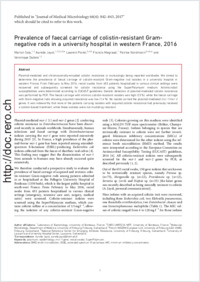Prevalence of faecal carriage of colistin-resistant Gram-negative rods in a university hospital in western France, 2016
- Saly, Marion Laboratory of Bacteriology, University of Bordeaux, France - CNRS UMR5234 MFP, University of Bordeaux, France
- Jayol, Aurélie Laboratory of Bacteriology, University of Bordeaux, France - CNRS UMR5234 MFP, University of Bordeaux, France - Molecular Microbiology, Department of Medicine, University of Fribourg, Switzerland - French INSERM European Unit, University of Fribourg (LEA-IAME), Switzerland - National Reference Center for Emerging Antibiotic Resistance, University of Fribourg, Switzerland
- Poirel, Laurent Molecular Microbiology, Department of Medicine, University of Fribourg, Switzerland - French INSERM European Unit, University of Fribourg (LEA-IAME), Switzerland - National Reference Center for Emerging Antibiotic Resistance, University of Fribourg, Switzerland
- Megraud, Francis Laboratory of Bacteriology, University of Bordeaux, France
- Nordmann, Patrice Molecular Microbiology, Department of Medicine, University of Fribourg, Switzerland - French INSERM European Unit, University of Fribourg (LEA-IAME), Switzerland - National Reference Center for Emerging Antibiotic Resistance, University of Fribourg, Switzerland - University of Lausanne and University Hospital Center, Lausanne, Switzerland
- Dubois, Véronique Laboratory of Bacteriology, University of Bordeaux, France - CNRS UMR5234 MFP, University of Bordeaux, France
-
2017
Published in:
- Journal of Medical Microbiology. - 2017, vol. 66, no. 6, p. 842–843
English
Plasmid-mediated and chromosomally-encoded colistin resistance is increasingly being reported worldwide. We aimed to determine the prevalence of faecal carriage of colistin-resistant Gram-negative rod isolates in a university hospital in western France. From February to May 2016, rectal swabs from 653 patients hospitalized in various clinical settings were recovered and subsequently screened for colistin resistance using the SuperPolymyxin medium. Antimicrobial susceptibilities were determined according to EUCAST guidelines. Genetic detection of plasmid-mediated colistin resistance was performed by PCR. The faecal carriage with intrinsic colistin-resistant isolates was high (23 %), while the faecal carriage with Gram-negative rods showing acquired resistance was low (1.4 %). No isolate carried the plasmid-mediated mcr- 1/mcr-2 genes. It was noteworthy that none of the patients carrying isolates with acquired colistin resistance had previously received a colistin-based treatment, while these isolates were not multidrug resistant.
- Faculty
- Faculté des sciences et de médecine
- Department
- Médecine 3ème année
- Language
-
- English
- Classification
- Biological sciences
- License
-
License undefined
- Identifiers
-
- RERO DOC 306946
- DOI 10.1099/jmm.0.000497
- Persistent URL
- https://folia.unifr.ch/unifr/documents/306466
Statistics
Document views: 104
File downloads:
- pdf: 178
